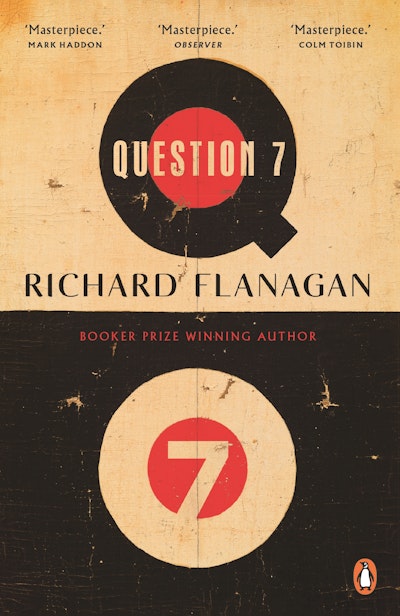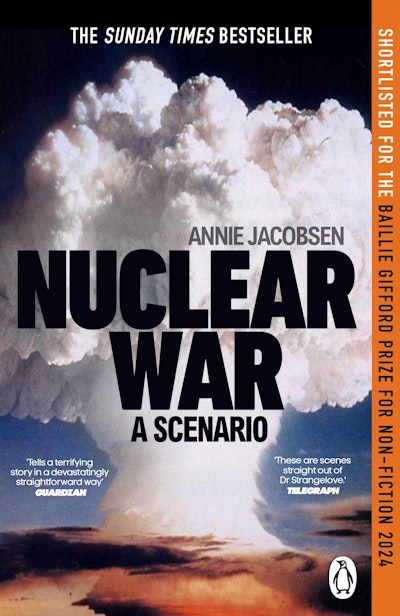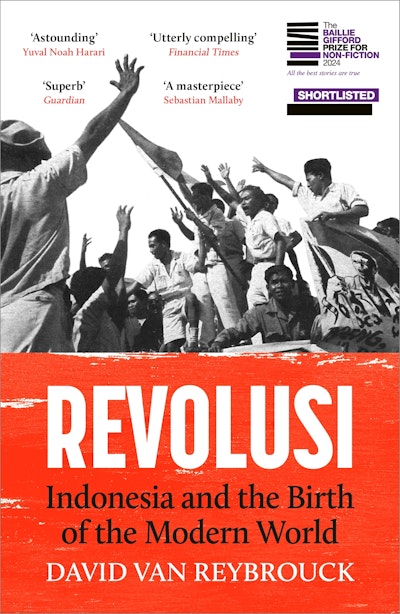Penguin Random House Australia is thrilled to have three titles recognised with this honour.
The shortlist for the Baillie Gifford Prize for Non-Fiction 2024 was announced on 10 October 2024. At an event at Cheltenham Literature Festival in the UK, prize judge Peter Hoskin named the six shortlisted books.
The winning author will be awarded £50,000, with the other shortlisted authors receiving £5,000 each.Of the six shortlisted titles, three are published by Penguin Random House: Question 7 by Richard Flanagan, Nuclear War: A Scenario by Annie Jacobsen and Revolusi: Indonesia and the Birth of the Modern World by David Van Reybrouck.
‘The six shortlisted books showcase a breathtaking range of subjects and styles, expand our understanding and challenge our perspectives,’ says chair of judges, Isabel Hilton. ‘Each one demonstrates exceptional scholarship and compelling narrative and offers profound insight into some of the most pressing issues of our time.’
Read on to learn more about each of the shortlisted titles and the authors who wrote them.
Baillie Gifford Prize shortlisted titles 2024
Question 7 by Richard Flanagan
Richard Flanagan’s books have received numerous honours and are published in 42 countries. With this shortlisting, he is in the running to become the first author to ‘win the double’ of both the Baillie Gifford and Booker Prize, which he won for his novel The Narrow Road to the Deep North in 2014.
In addition to the Baillie Gifford Prize, Question 7 has also been shortlisted for France’s premier literary award, the Prix Femina 2024.

Beginning at a love hotel by Japan’s Inland Sea and ending by a river in Tasmania, Question 7 is about the choices we make about love and the chain reaction that follows.
By way of H. G. Wells and Rebecca West’s affair through 1930s nuclear physics to Flanagan's father working as a slave labourer near Hiroshima when the atom bomb is dropped, this genre-defying daisy chain of events reaches fission when Flanagan as a young man finds himself trapped in a rapid on a wild river not knowing if he is to live or to die.
At once a love song to his island home and to his parents, this hypnotic melding of dream, history, literature, place and memory is about how reality is never made by realists and how our lives so often arise out of the stories of others and the stories we invent about ourselves.
Nuclear War: A Scenario by Annie Jacobsen
Based on dozens of interviews with military and civilian experts, Annie Jacobsen’s Nuclear War: A Scenario is a prime example of great research and great writing working together. Jacobsen’s books have been named Best of the Year and Most Anticipated by outlets including The Washington Post, USA Today and many others. Jacobsen was also named a Pulitzer Prize Finalist for Nuclear War: A Scenario for its ‘brilliantly researched account of a small but powerful secret government agency whose military research profoundly affects world affairs.’

We could have an uninhabitable earth in a century. It could take 26 minutes and 40 seconds. An edge-of-your-seat non-fiction thriller that has to be read to be believed.
Up to now, no one outside of official circles has known exactly what would happen if a rogue state launched a nuclear missile at the Pentagon. Second by second and minute by minute, these are the real-life protocols that choreograph the end of civilisation as we know it. Frantic calls over secure lines work to confirm the worst as armoured helicopters are scrambled to evacuate the chosen few to secure bunkers. One nuclear missile will provoke two dozen in return. Decisions over hundreds of millions of lives need to be made within six minutes, based on partial information, knowing that once launched, nothing is capable of halting the destruction.
Based on dozens of new interviews with military and civilian experts, Nuclear War is at once a compulsive non-fiction thriller and a powerful argument that we must rid ourselves of these world-ending weapons for ever.
Revolusi: Indonesia and the Birth of the Modern World by David Van Reybrouck
David Van Reybrouck is a pioneering advocate of participatory democracy and one of the most highly regarded literary and political writers of his generation.
In addition to writing, Van Reybrouck is also the founder of the G1000 Citizens’ Summit, and his work has led to trials in participatory democracy throughout Belgium and The Netherlands. Revolusi: Indonesia and the Birth of the Modern World has been praised by authors including J M Coetzee and Yuval Harari, and dubbed an ‘immensely readable new history’ by The Atlantic.

A true masterpiece of narrative history and the definitive story of the revolution that ignited the end of colonialism worldwide.
A story of staggering scope and drama, Revolusi is the masterful and definitive account of the epic revolution that sparked the decolonisation of the modern world.
On a sunny Friday morning in August 1945, a handful of tired people raised a homemade cotton flag and on behalf of 68 million compatriots announced the birth of a new nation. With the fourth largest population in the world, inhabiting islands that span an eighth of the globe, Indonesia became the first colonised country to declare its independence after the Second World War.
Four million civilians had died during the wartime occupation by the Japanese that ousted the Dutch colonial regime. Another 200,000 people would lose their lives in the astonishingly brutal conflict that ensued - as the Dutch used savage violence to reassert their control, and as Britain and America became embroiled in pacifying Indonesia's guerrilla war of resistance: the 'revolusi'. It was not until December 1949 that the newly created United Nations forced The Netherlands to cede all sovereignty to Indonesia, finally ending 350 years of colonial rule and setting a precedent that would reshape the world.
Drawing on hundreds of interviews and eye-witness testimonies, David Van Reybrouck turns this vast and complex story into an utterly gripping narrative that is alive with human detail at every turn. A landmark publication, Revolusi shows Indonesia's struggle for independence to be one of the defining dramas of the twentieth century and establishes its author as one of the most gifted narrative historians at work in any language today.















